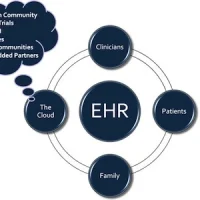Cloud plays an important role in any hospital's digital transformation. The technology can help improve workflows and provide access to new information for better patient care, while maintaining security and required governance, according to an article in HealthcareBusinessTech.com.
"While most think of the public cloud when they hear the term, cloud can be implemented in different ways, including public, private and hybrid models," writes the author, Brendan Ziolo, head of large enterprise strategy at Alcatel-Lucent, an IP networking and cloud technology company. He suggests that hospitals should choose deployment models that best match their requirements in terms of security, costs and operational flexibility.
Public or Private Cloud?
Public cloud is made available over the internet to the general public or a large industry group and is owned by a cloud provider. Public clouds lease infrastructure to different clients, thus data or workloads may be on common systems — making access control and encryption very important. Public cloud can be faster to implement and eliminates ongoing maintenance and management costs with a pay-as-you-go model. This service is suitable for applications that don’t have strict security requirements.
In healthcare, data security is paramount and providers are wary of using public cloud. A private cloud is typically deployed on the healthcare provider’s premises, but they can also be deployed off-premises as a virtual private cloud. In this case, healthcare organisations should work closely with the service provider to ensure security.
In a private cloud environment, software, storage and compute can become part of a single platform that is connected through a private network. This makes it easier for healthcare IT teams to monitor data flows, usage, and system performance. "With visibility across all networked activity, IT departments can apply controls using analytics and automation for secure action and response across the entire system," Ziolo explains.
Future-proof Infrastructure
Hybrid interoperability is an important consideration when designing a private cloud. This means different types of clouds may be joined together, such as a private cloud and a public cloud service. In the future, some applications may be determined to be suitable for a public cloud or may need to connect to another healthcare community cloud. "By designing with a hybrid environment in mind," the author notes, "organisations can future-proof their infrastructure to ensure interoperability and make their environments more scalable."
Source: HealthcareBusinessTech.com
Image credit: Pixabay
"While most think of the public cloud when they hear the term, cloud can be implemented in different ways, including public, private and hybrid models," writes the author, Brendan Ziolo, head of large enterprise strategy at Alcatel-Lucent, an IP networking and cloud technology company. He suggests that hospitals should choose deployment models that best match their requirements in terms of security, costs and operational flexibility.
Public or Private Cloud?
Public cloud is made available over the internet to the general public or a large industry group and is owned by a cloud provider. Public clouds lease infrastructure to different clients, thus data or workloads may be on common systems — making access control and encryption very important. Public cloud can be faster to implement and eliminates ongoing maintenance and management costs with a pay-as-you-go model. This service is suitable for applications that don’t have strict security requirements.
In healthcare, data security is paramount and providers are wary of using public cloud. A private cloud is typically deployed on the healthcare provider’s premises, but they can also be deployed off-premises as a virtual private cloud. In this case, healthcare organisations should work closely with the service provider to ensure security.
In a private cloud environment, software, storage and compute can become part of a single platform that is connected through a private network. This makes it easier for healthcare IT teams to monitor data flows, usage, and system performance. "With visibility across all networked activity, IT departments can apply controls using analytics and automation for secure action and response across the entire system," Ziolo explains.
Future-proof Infrastructure
Hybrid interoperability is an important consideration when designing a private cloud. This means different types of clouds may be joined together, such as a private cloud and a public cloud service. In the future, some applications may be determined to be suitable for a public cloud or may need to connect to another healthcare community cloud. "By designing with a hybrid environment in mind," the author notes, "organisations can future-proof their infrastructure to ensure interoperability and make their environments more scalable."
Source: HealthcareBusinessTech.com
Image credit: Pixabay
Latest Articles
healthmanagement, digital healthcare, cloud, cloud computing, data security, interoperability
Cloud plays an important role in any hospital's digital transformation. The technology can help improve workflows and provide access to new information for better patient care, while maintaining security and required governance, according to an article in










